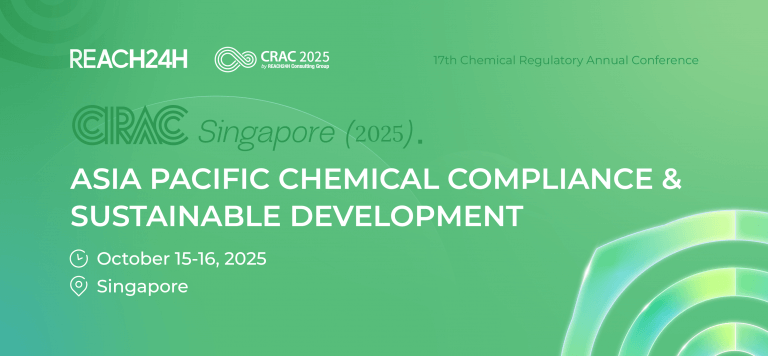Hangzhou, China – September 12, 2025 – The 17th Chemical Regulatory Annual Conference (CRAC China 2025) concluded successfully at the scenic West Lake in Hangzhou. Organized by REACH24H Consulting Group, the conference brought together over 400 representatives from governments, international organizations, media, and enterprises to discuss green transition, regulatory innovation, and sustainable growth.
In addition to the main forum on "Global Chemical Management and Sustainable Development," the conference featured the “Global Pesticide Registration and Practical Innovation” session, which provided a professional platform for technical exchange, policy discussion, and strategic insights for the pesticide industry. Key topics included global registration pathways, residue and efficacy testing, environmental assessment, and AI-driven efficiency improvements in regulatory compliance.
Driving Global Pesticide Development Through International Collaboration and Innovation
Mr. Chuanjun Tang, Deputy Director of the Crop and Seed Industry Administration Division, Department of Agriculture and Rural Affairs of Zhejiang Province, highlighted the rapid, high-quality development of the pesticide industry through detailed data. He emphasized that the forum is aimed at guiding the sector toward greener and smarter growth through global expertise, international dialogue, and collaboration.
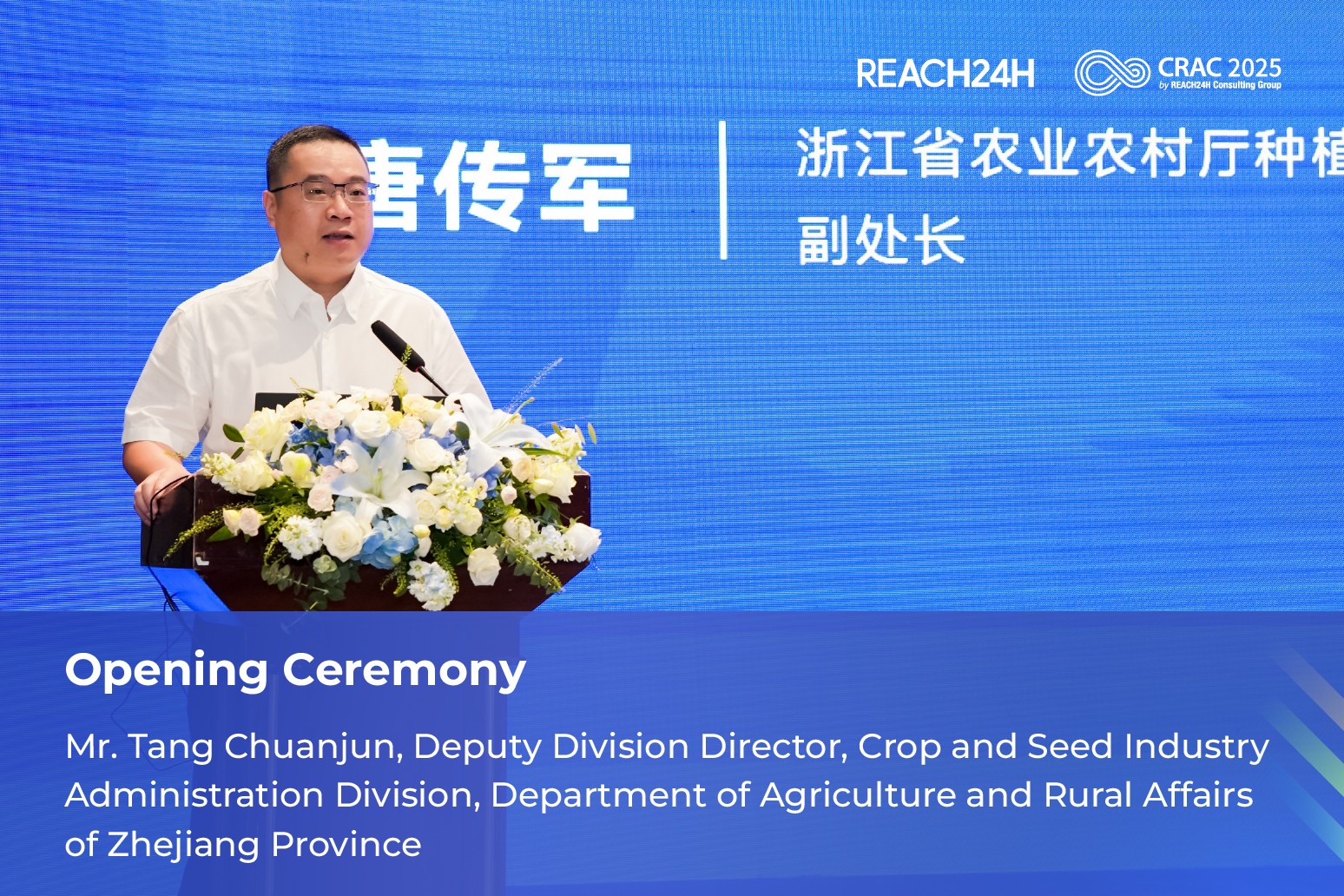
Mr. Fangwei Hong, Chairman and CEO of REACH24H Consulting Group, noted that the agrochemical industry is at a critical crossroads, facing complex international dynamics, overcapacity, and high pressures for green transformation. He emphasized that with the long development cycles, significant investment, and stringent evaluation requirements of new pesticides, companies must find ways to accelerate market entry without compromising safety and efficacy. In response, the conference specially featured the “Global Pesticide Registration and Practical Innovation” session, exploring three key directions—internationalization, technological breakthroughs, and green innovation—helping enterprises navigate uncertainty and find a balanced path forward.
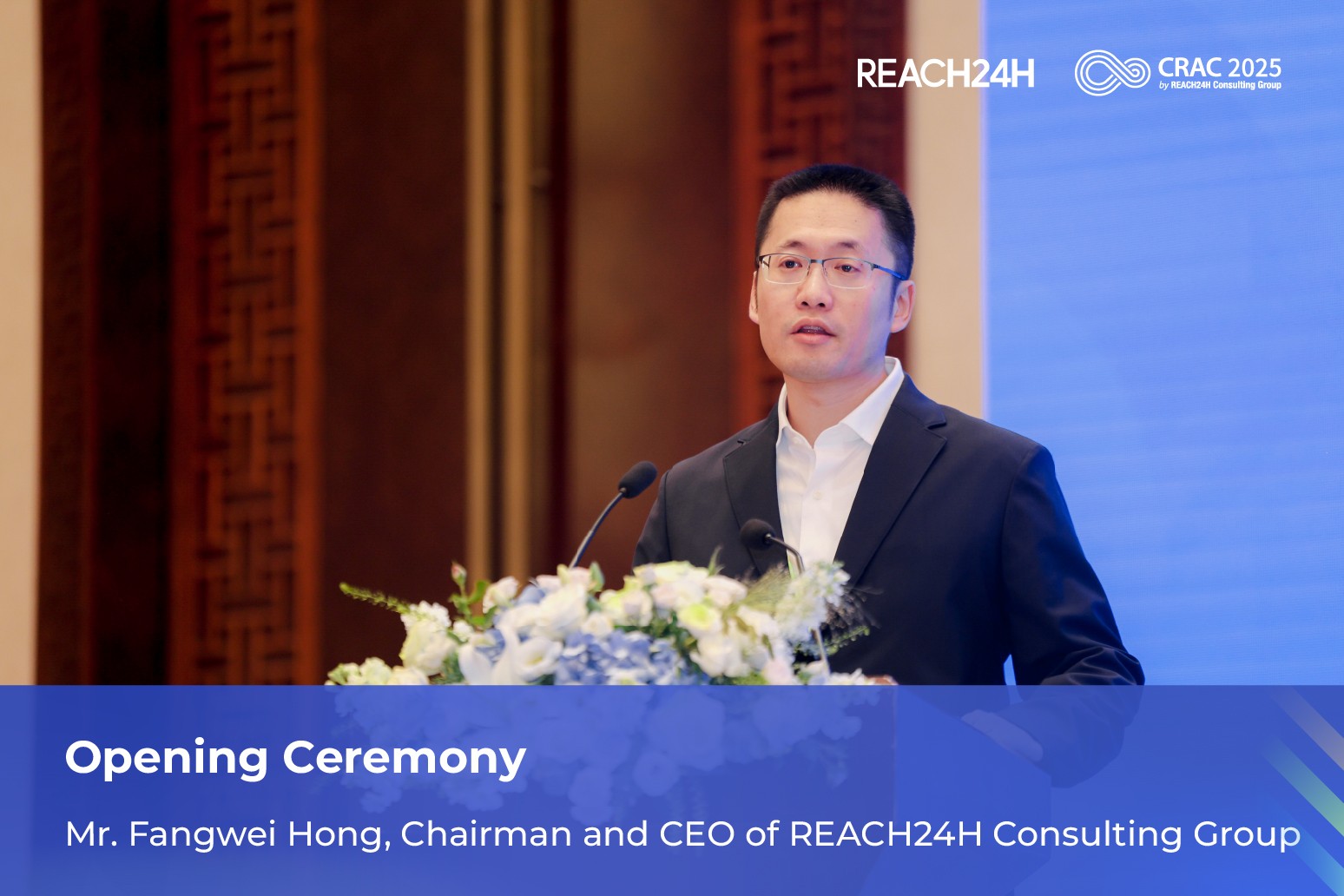
As the guest moderator, Ms. Yaping Liu, Chief Representative of the Beijing Office and Executive Director of China Society of Plant Protection (CSPP), set the tone for the session on “Global Pesticide Registration and Practical Innovation”. She highlighted how increasingly strict regulatory frameworks worldwide are reshaping the pesticide industry and called for deeper dialogue on new pesticide R&D challenges, re-registration trends, and international cooperation.
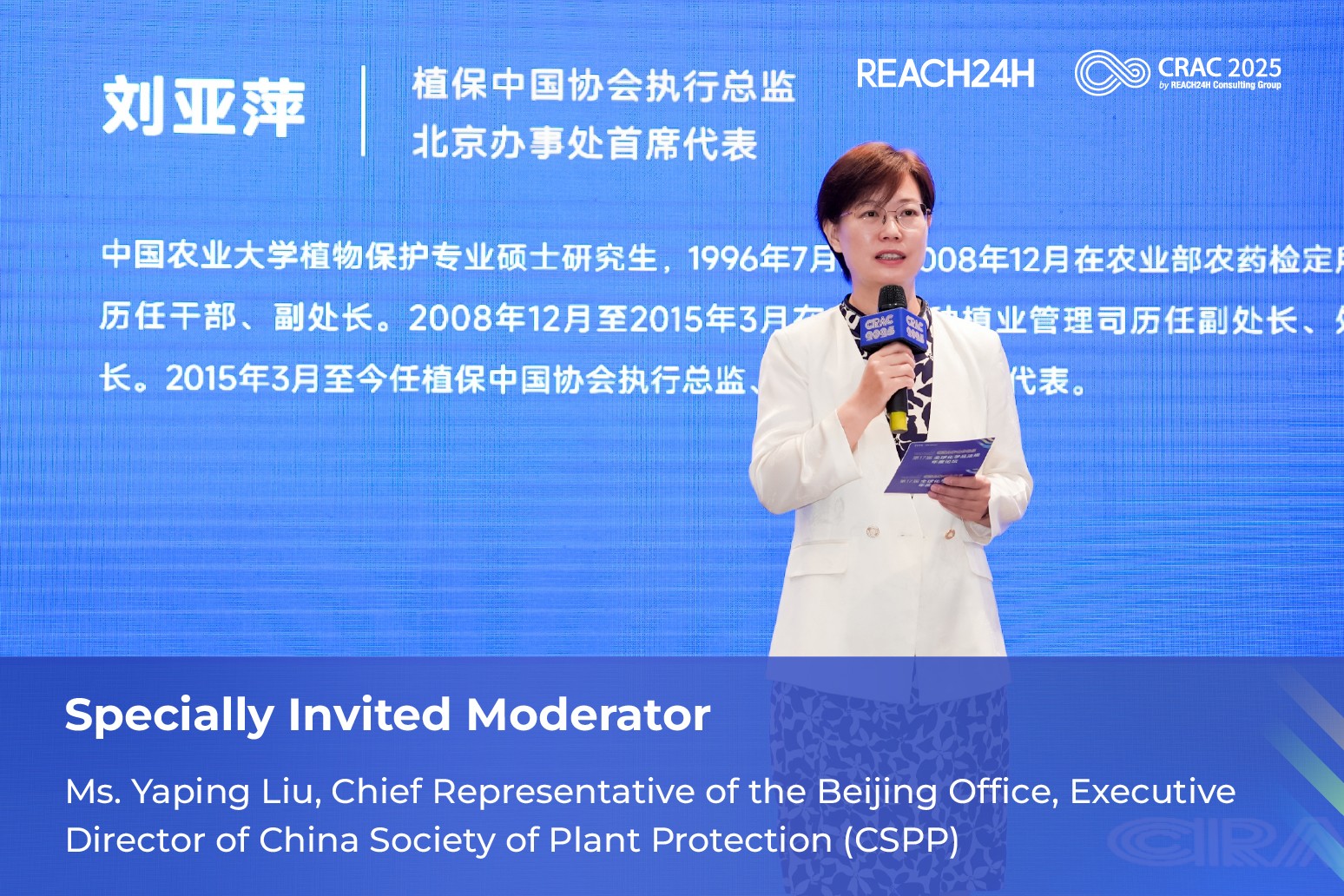
China’s Regulatory Evolution: Toward Efficiency and Global Integration
Ms. Yongzhen Yang, as an international expert, provided a systematic analysis of the latest trends in global pesticide registration and re-evaluation. She noted that while China manages a large volume of registrations, a significant proportion involves older pesticide varieties. The country still faces challenges such as an incomplete regulatory framework, a lack of international data recognition mechanisms, and mounting international compliance pressures.
She emphasized the need to accelerate the development of a scientific, transparent, and efficient pesticide regulatory system, promote the industry’s transformation toward greener, higher-end, and more intelligent solutions, and encourage enterprises to strengthen innovation, actively engage in global competition, and achieve high-quality sustainable development.
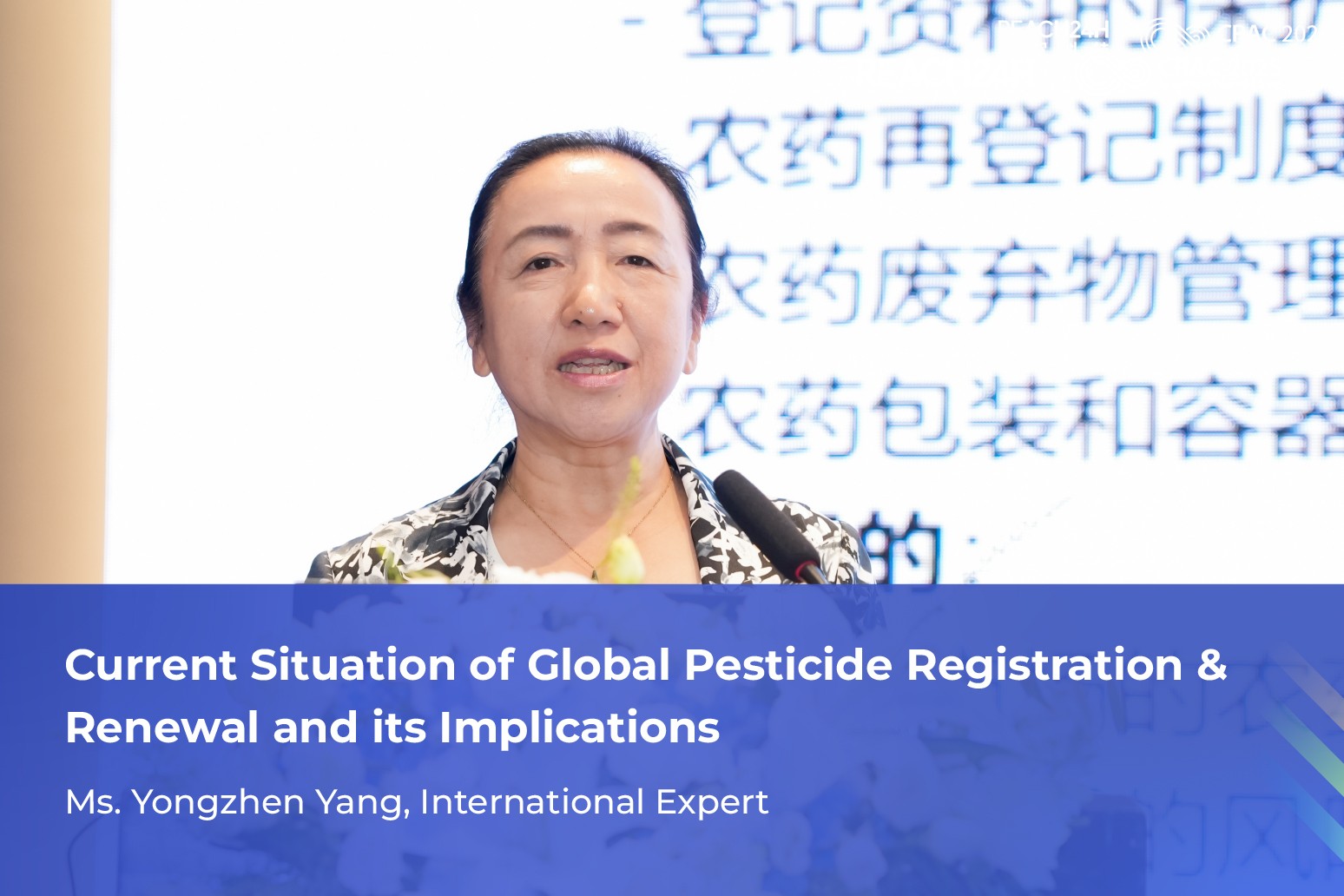
Advancing Residue Testing and Compliance through AI and Technology
Mr. Fengshou Dong, Researcher at the Institute of Plant Protection, Chinese Academy of Agricultural Sciences, provided a systematic analysis of the development and current status of pesticide residue trials in China. He highlighted that China has made significant progress in establishing a comprehensive residue testing system, covering multiple pesticide types and crop scenarios. The country has also implemented grouped registration and trial exemption mechanisms, improving evaluation efficiency.
However, technical challenges remain in areas such as metabolite identification, complex matrix detection, and assessment of emerging scenarios like UAV pesticide application, and gaps persist in international data recognition.
Mr. Dong emphasized the need to strengthen alignment with international standards, promote the application of computational toxicology and artificial intelligence, and continuously refine the national standards system.
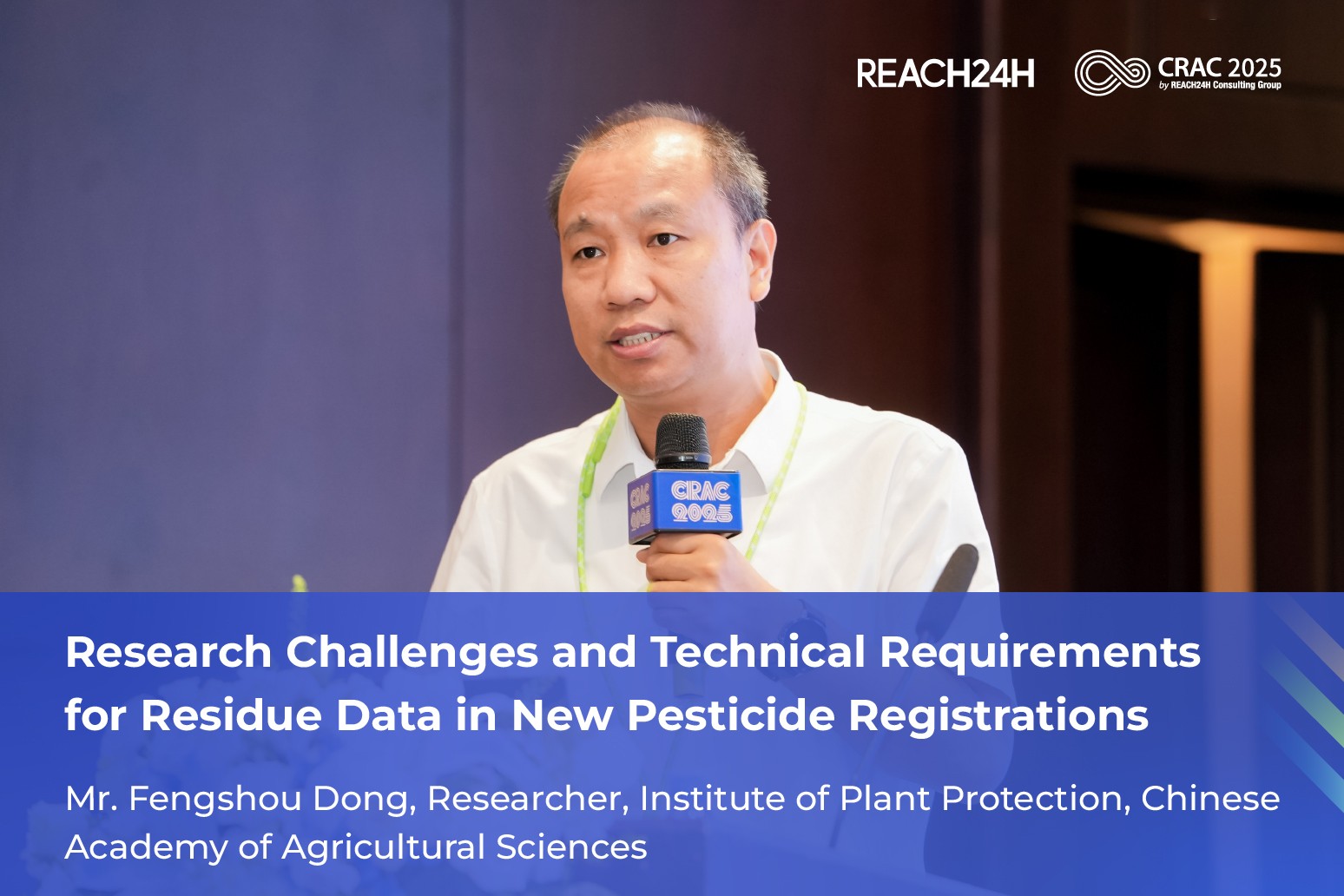
China Advances Pesticide Efficacy Evaluation to Support Green Innovation
Ms. Jie Chen, Professor from Zhejiang A&F University, highlighted that China has established a comprehensive pesticide efficacy evaluation system, comprising 375 national and industry standards covering both field and indoor trials.
Despite these advancements, challenges remain in target cultivation standardization, compatibility of pesticide mixtures, and complexity of resistance risk assessment. Ms. Chen emphasized the need to further strengthen target standardization, drive methodological innovation, and foster interdisciplinary collaboration. She noted that these efforts will support the development of green new pesticides, including RNA interference-based and immune-inducing technologies, and help guide the industry toward more precise, efficient, and sustainable solutions.
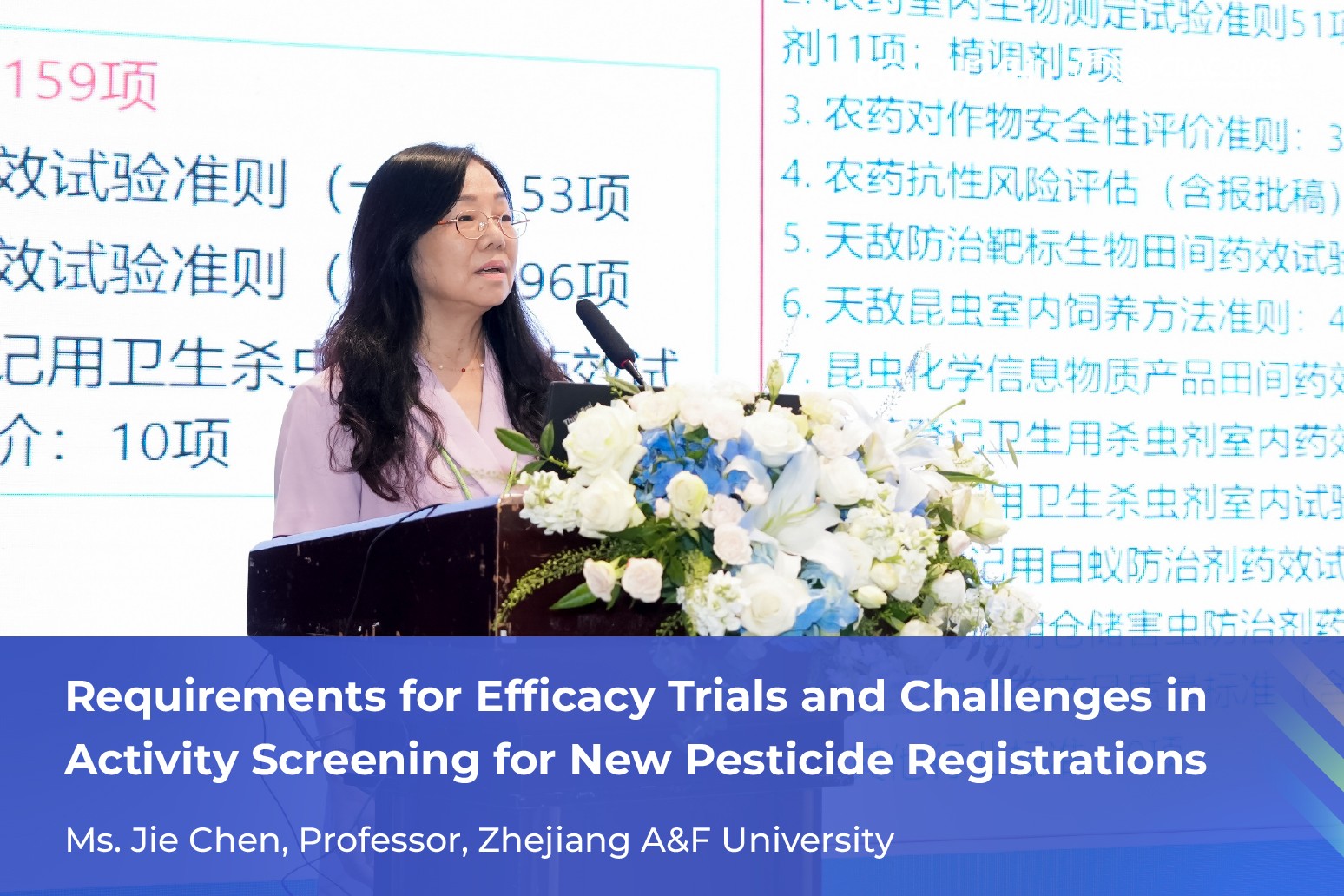
China Strengthens Environmental Risk Assessment for New Pesticide Registration
Mr. Xingang Liu, Professor at the Institute of Plant Protection, Chinese Academy of Agricultural Sciences, provided a systematic analysis of the technical key points in environmental testing for new pesticide registration. China has established a comprehensive testing system covering ecotoxicology and environmental fate, including toxicity studies on multiple species such as aquatic organisms, birds, bees, and silkworms, as well as research on hydrolysis, photolysis, soil adsorption, and metabolism. This provides a solid foundation for environmental risk assessment of pesticides.
However, challenges remain for enterprises in areas such as initial review of test reports, metabolite tracking, assessment of combined pollution, and international data recognition. Mr. Liu emphasized the need to further strengthen method standardization, ensure data quality control, and foster interdisciplinary collaboration to address these gaps effectively.
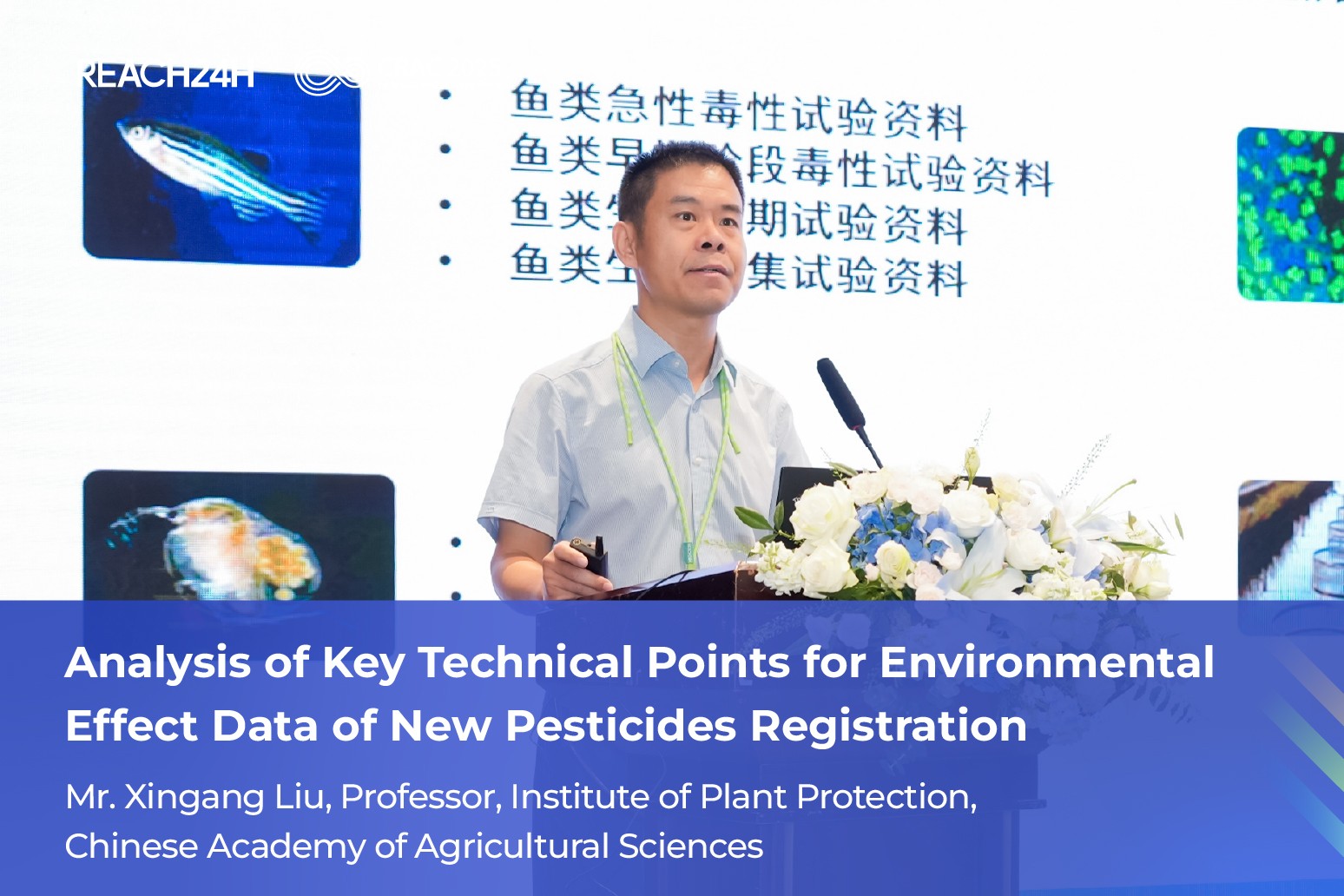
Leveraging Computational Tools to Improve Registration Efficiency
Mr. Chao Huang, Technical Expert at REACH24H Consulting Group, addressed complex challenges in metabolite toxicity tracing and long-term risk assessment of non-target organisms. He emphasized computational toxicology, ecological modeling, and early dialogue with regulators as strategies to improve compliance efficiency and market approval success.
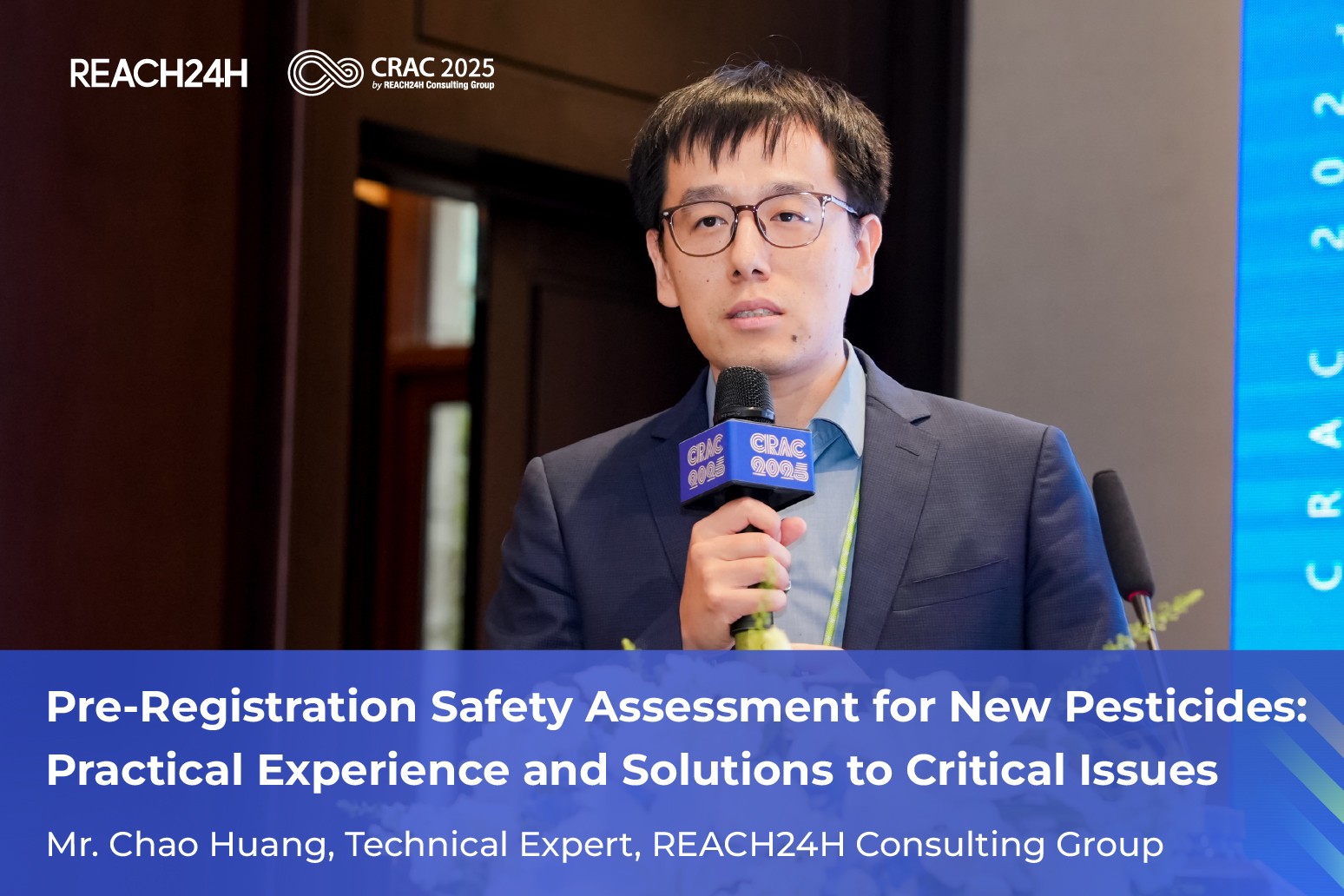
European Perspectives: Regional Cooperation and Digital Pathways
Mr. Martin Weiszenstein, Head of Chemical Safety Department & Head of National Reference Centre for Pesticides, National Institute of Public Health, Prague, Czech Republic, explained the European Union’s framework for pesticide evaluation. The EU divides its member states into Northern, Central, and Southern regions, with designated zonal Rapporteur Member States (zRMS), aiming to optimize assessment resources and coordinate procedures.
However, he noted that in practice, challenges remain, including inconsistent interpretations among member states, evaluation delays, differences in metabolite regulation, and inconsistent application of the precautionary principle. Looking ahead, Mr. Weiszenstein emphasized the need to further harmonize assessment standards, digitize evaluation procedures, strengthen inter-member cooperation, and improve data mutual recognition, thereby enhancing authorization efficiency and transparency.
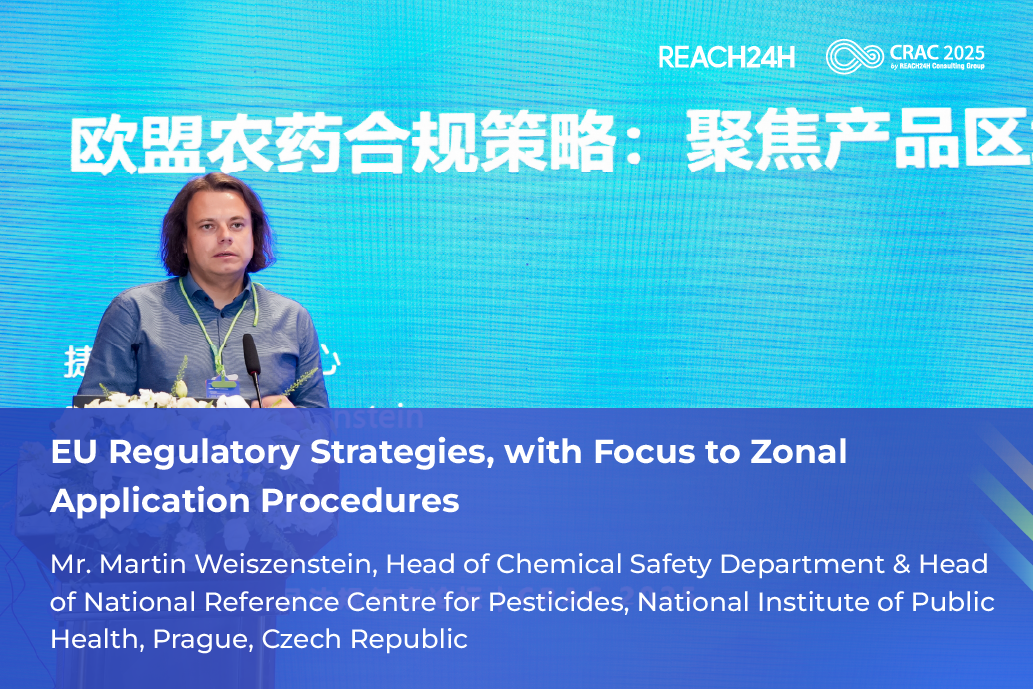
Brazil’s Pesticide Opportunities under Regulatory Reform
Mr. Jose Victor Torres Alves Costa, Coordinator-General of Pesticides, Brazil's Ministry of Agriculture, outlined that the country's new pesticide regulations streamline reviews, encourage biopesticides, and promote digital registration (SISPA), creating significant market opportunities for companies. He encouraged companies to focus on resistance management and high-priority diseases like soybean rust while leveraging local trial collaborations and integrating locally generated data.
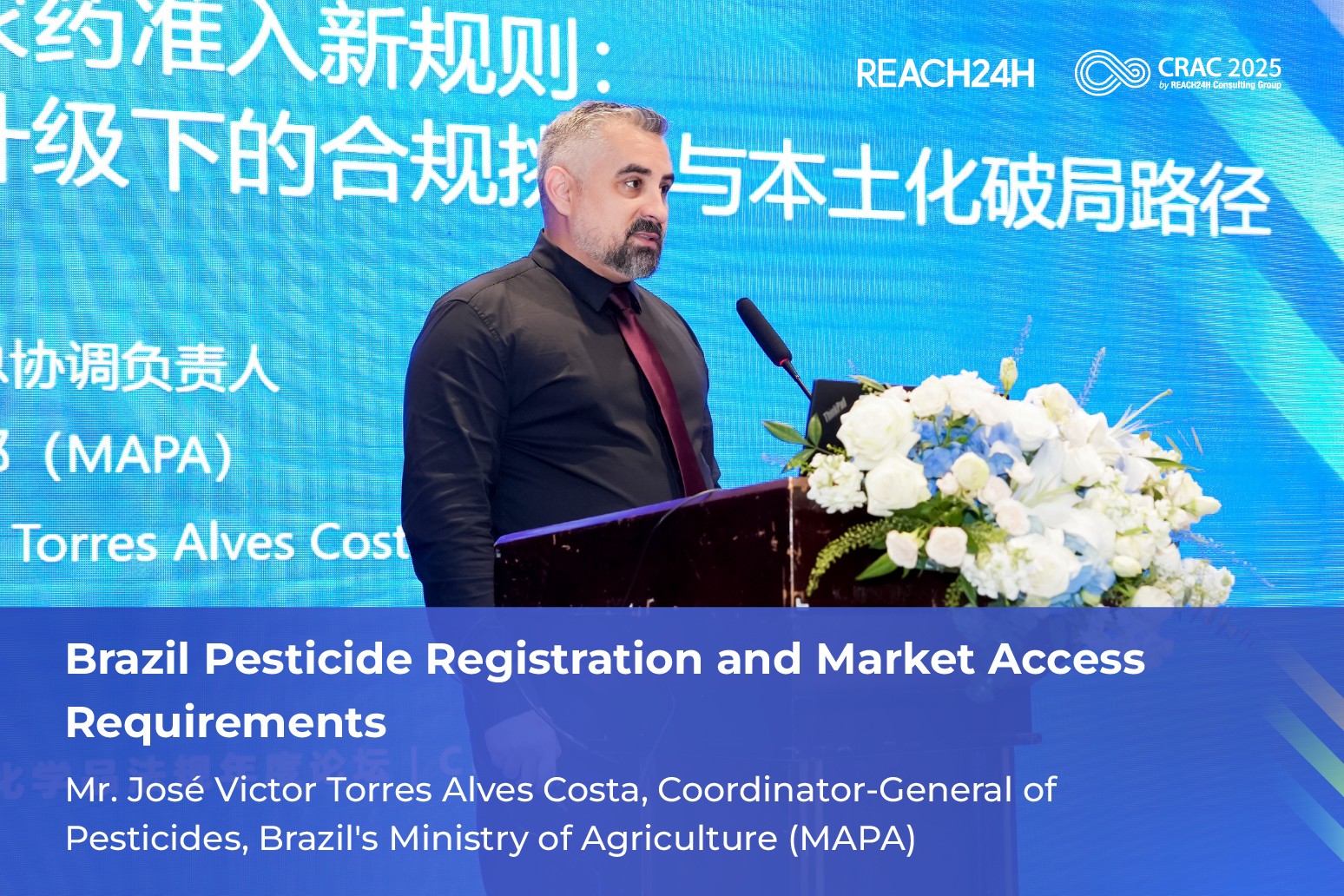
Data-Driven Approaches to Reduce Risks in Canadian Registration
As for Canada, the Pest Management Regulatory Agency (PMRA) representative analyzed the country's registration rules based on data protection and paid sharing, focusing on data citation, compensation calculation, and negotiation and arbitration procedures. Companies are recommended to plan their data strategies in advance, choose collaborative licensing, and joint data submission to optimize market access while reducing infringement risks.
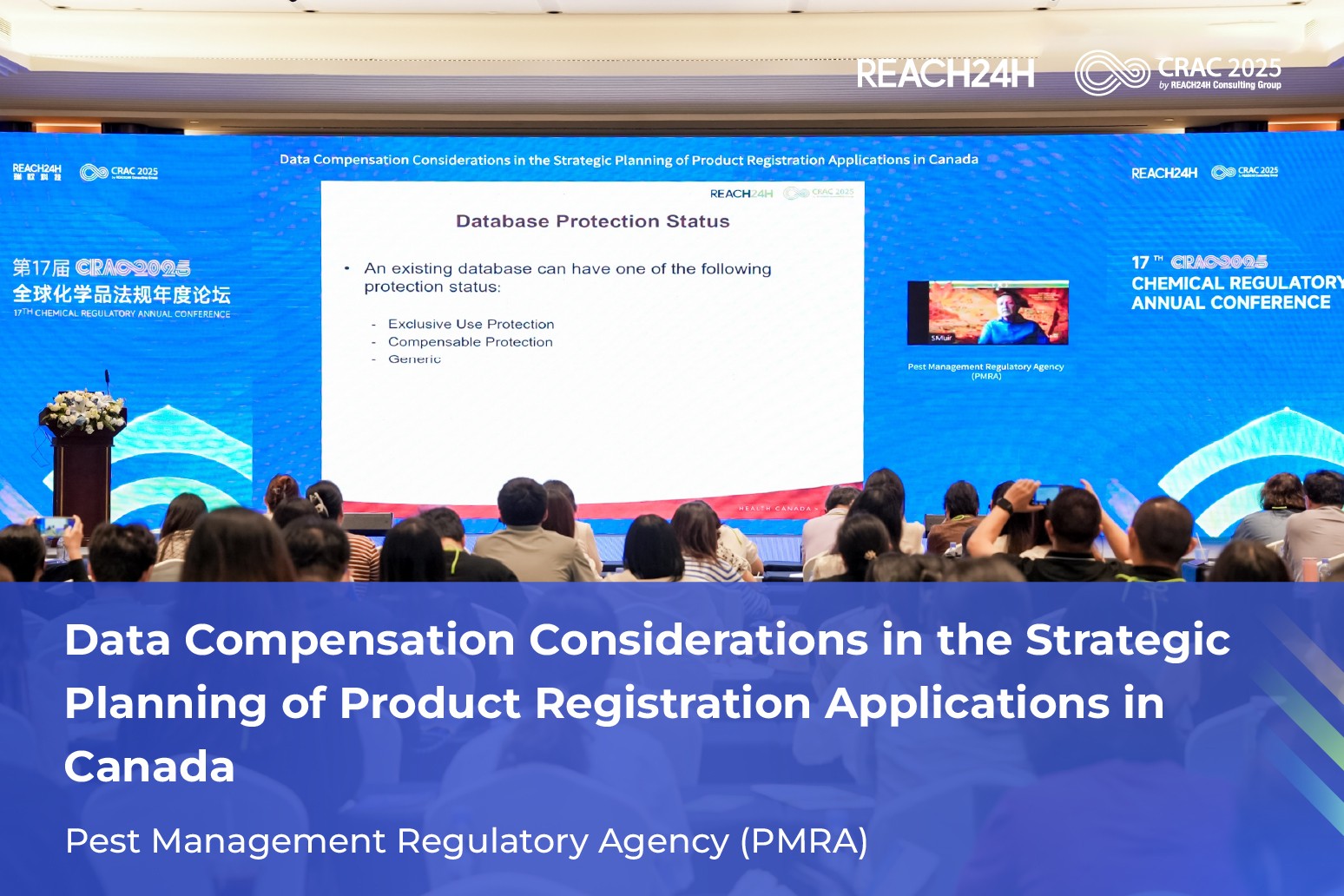
Southeast Asia: Emerging Market Potential and Digital Compliance Strategies
Mr. C S Liew, Managing Director of Pacific Agriscience Pte Ltd., Singapore, pointed out Southeast Asia’s unique challenges, from fragmented smallholder farming to climate stresses. He identified major opportunities in biostimulants, microbial fertilizers, biopesticides, low-carbon rice, and cash crops such as durians and other tropical fruit cultivation. He suggested that companies should focus on developing differentiated products, promote simplified technologies that meet the needs of small farmers, and use digital tools such as the Internet of Things and blockchain to improve supply chain credibility and compliance, especially for fresh food exporters and for adoption in large plantations such as oil palm.
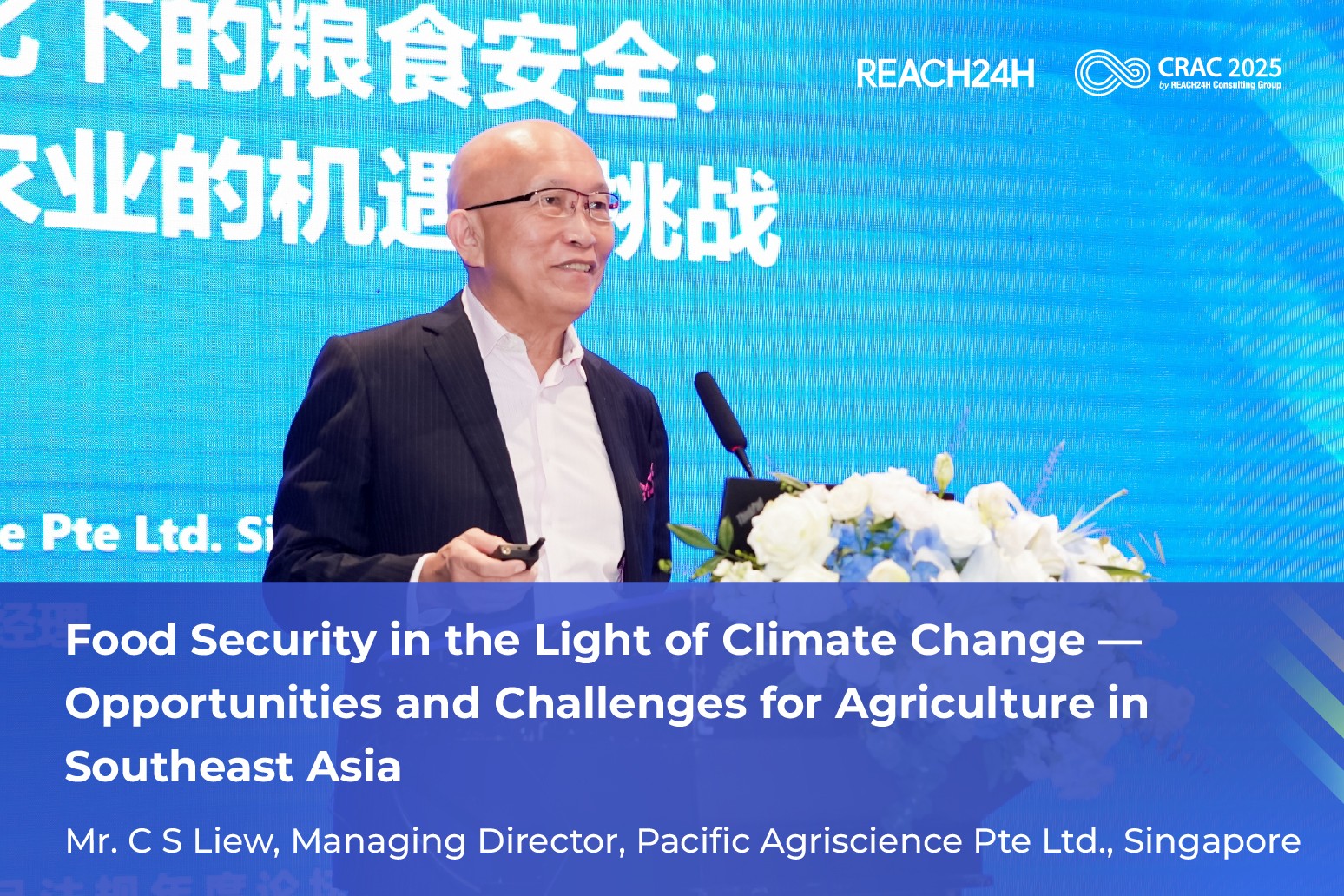
Global Patent Strategy: Safeguarding Innovation in the Pesticide Industry
Ms. Lichun Si, General Manager of Beijing Yuehe Intellectual Property Agency Co., Ltd., emphasized global patent strategy as critical for protecting innovation and enabling market expansion. She recommended that pesticide companies systematically develop a global patent portfolio, strengthen their ability to identify and respond to infringement risks, prioritize early patent searches and monitoring, and leverage third-party public opinion, invalidation statements, and licensing partnerships to mitigate risk.
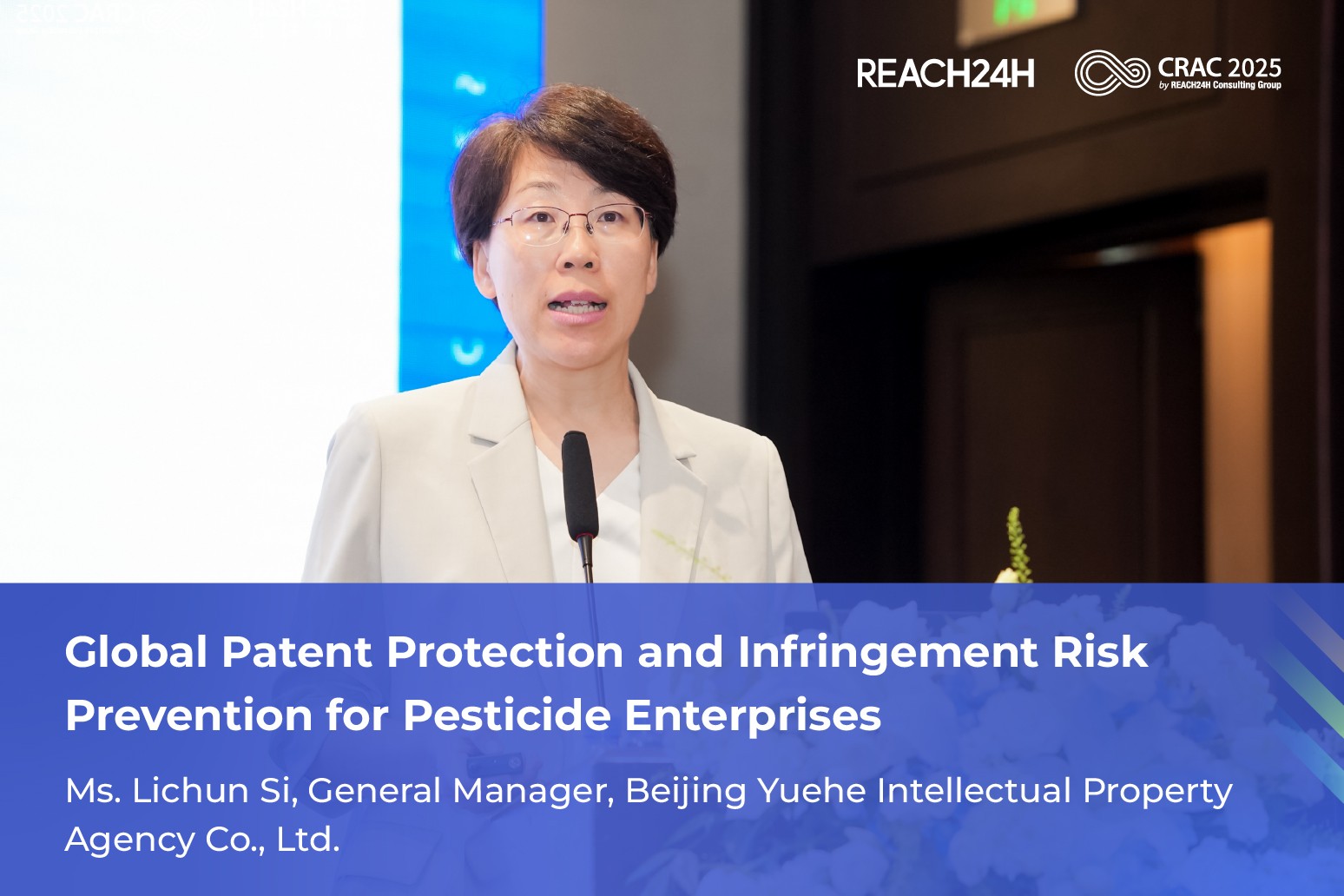
Harnessing AI + Knowledge Graphs to Enhance Risk Management in Agrochemical Operations
Mr. Sudeliang Su, General Manager of Shanghai Haifan Technology Co., Ltd., highlighted that by leveraging AI + knowledge graph technology, enterprises can systematically build decision-support systems for abnormal operating conditions. This enables intelligent alarm filtering, multi-dimensional risk analysis, and real-time guidance for incident response.
Mr. Su advised agrochemical companies to actively advance the construction of process risk knowledge graphs and expand the deployment of AI-assisted decision-making systems across global production sites, providing strong technological support for safe production and operational excellence.
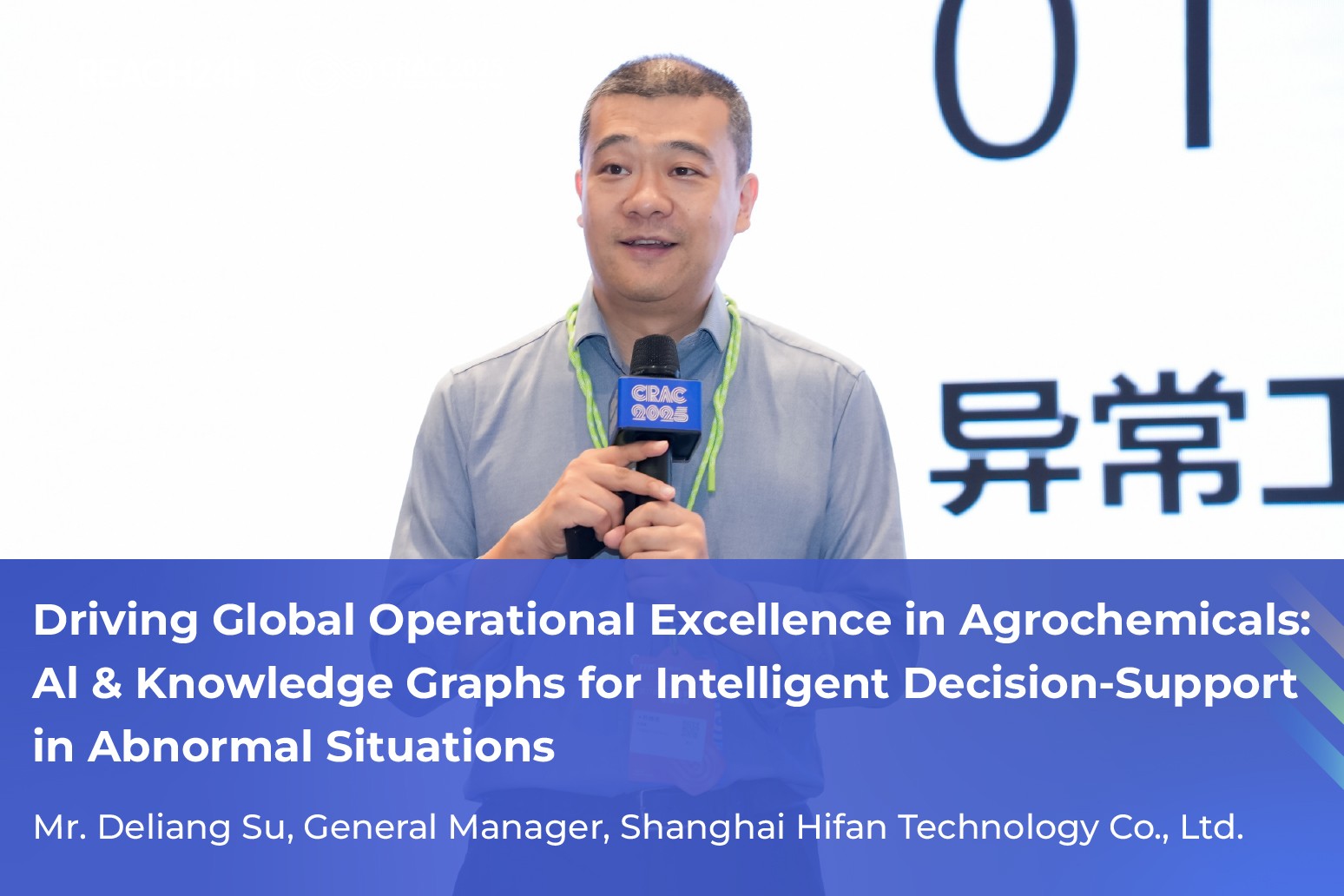
REACH24H Showcases AI-Enabled Efficiency in International Pesticide Registration
At this year’s forum, REACH24H Consulting Group hosted a special session entitled "AI & Global Pesticide Registration Training Course". Led by REACH24H’s team of agrochemical technical experts, the session shared hands-on registration experiences across key markets, including China, the European Union, the United States, Australia, and Canada.
Key topics included automated data processing, optimized regulatory response strategies, and compliance risk mitigation techniques. The discussion highlighted how AI tools can drive intelligent automation throughout the entire registration process, while boosting efficiency and success rates.
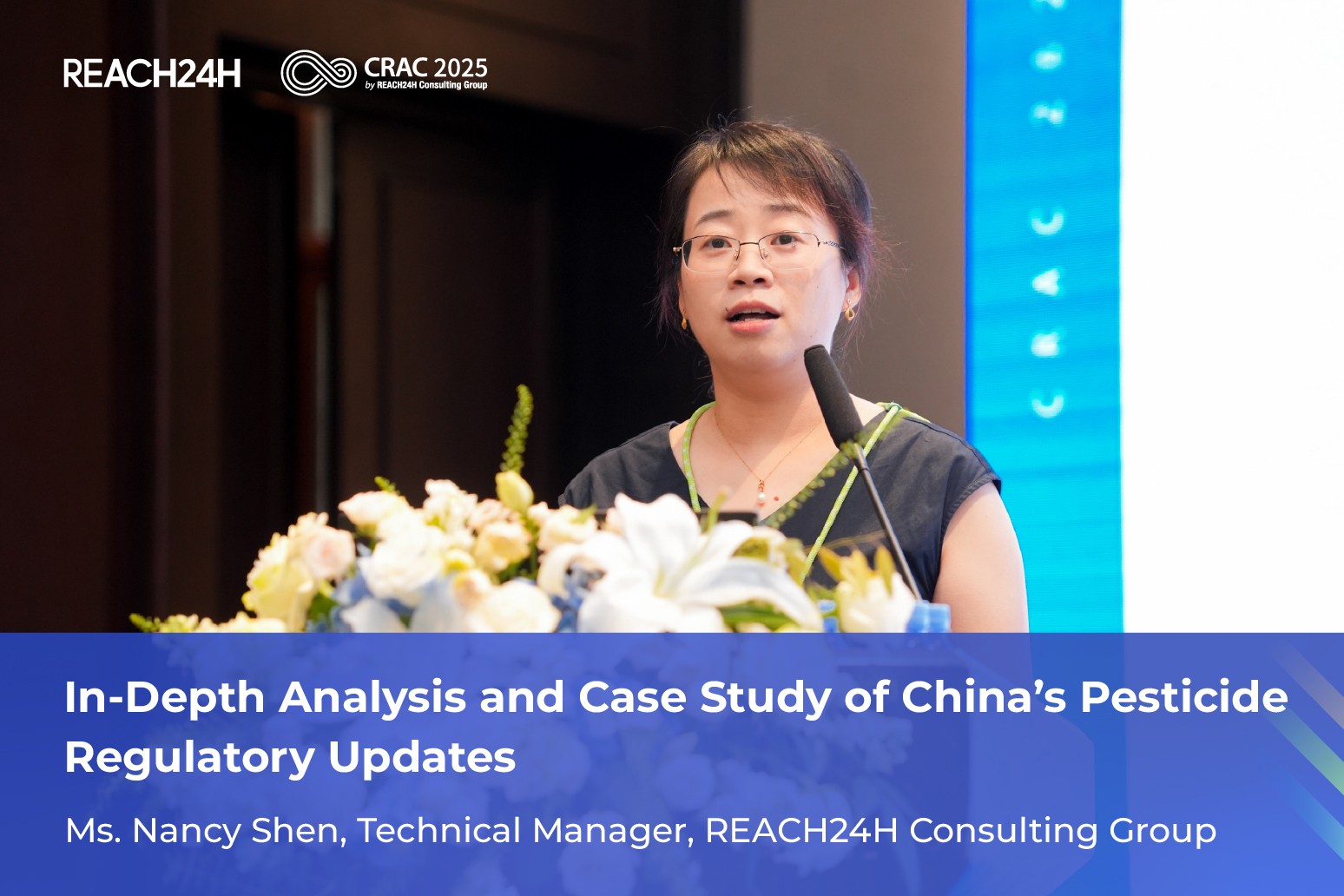
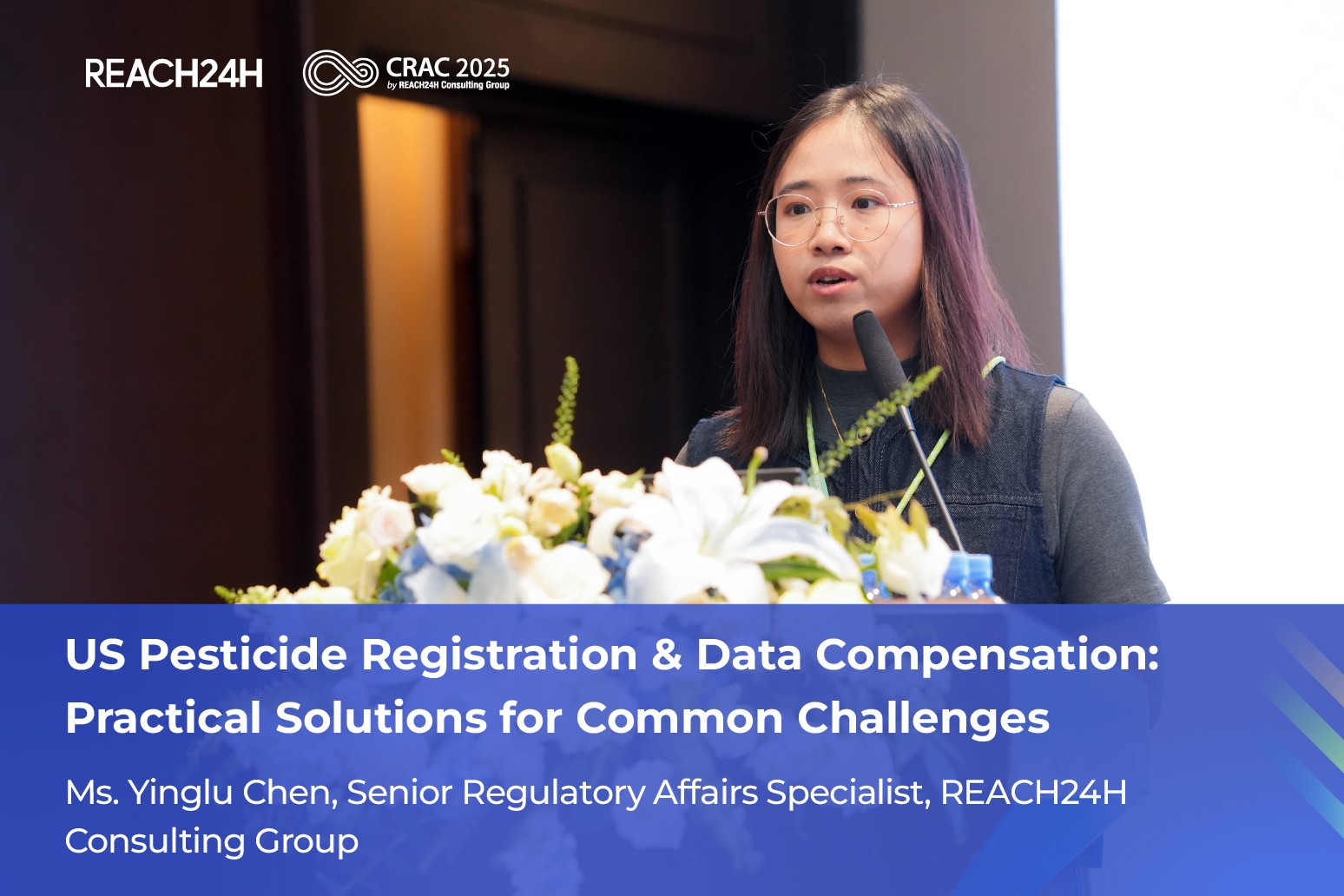
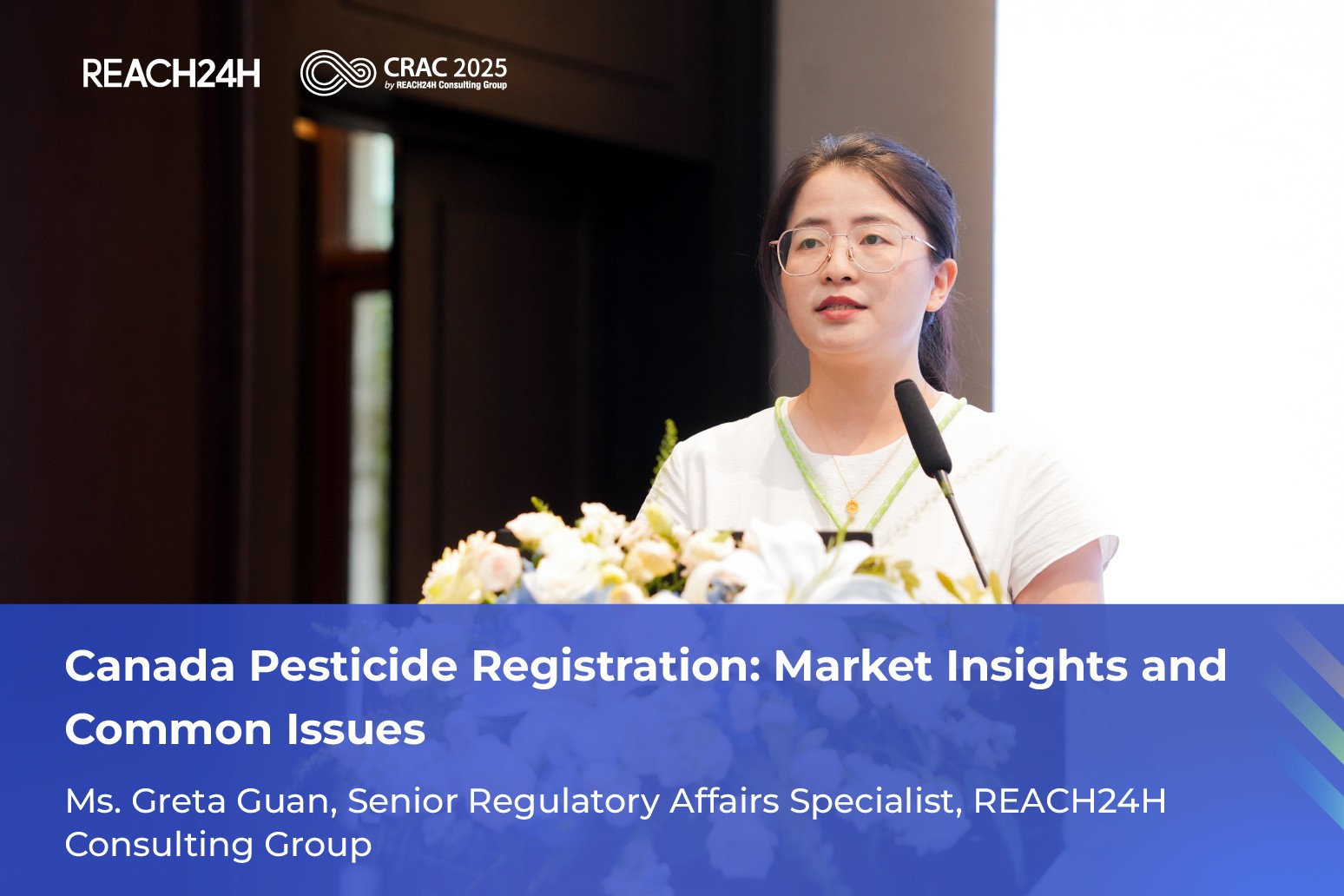
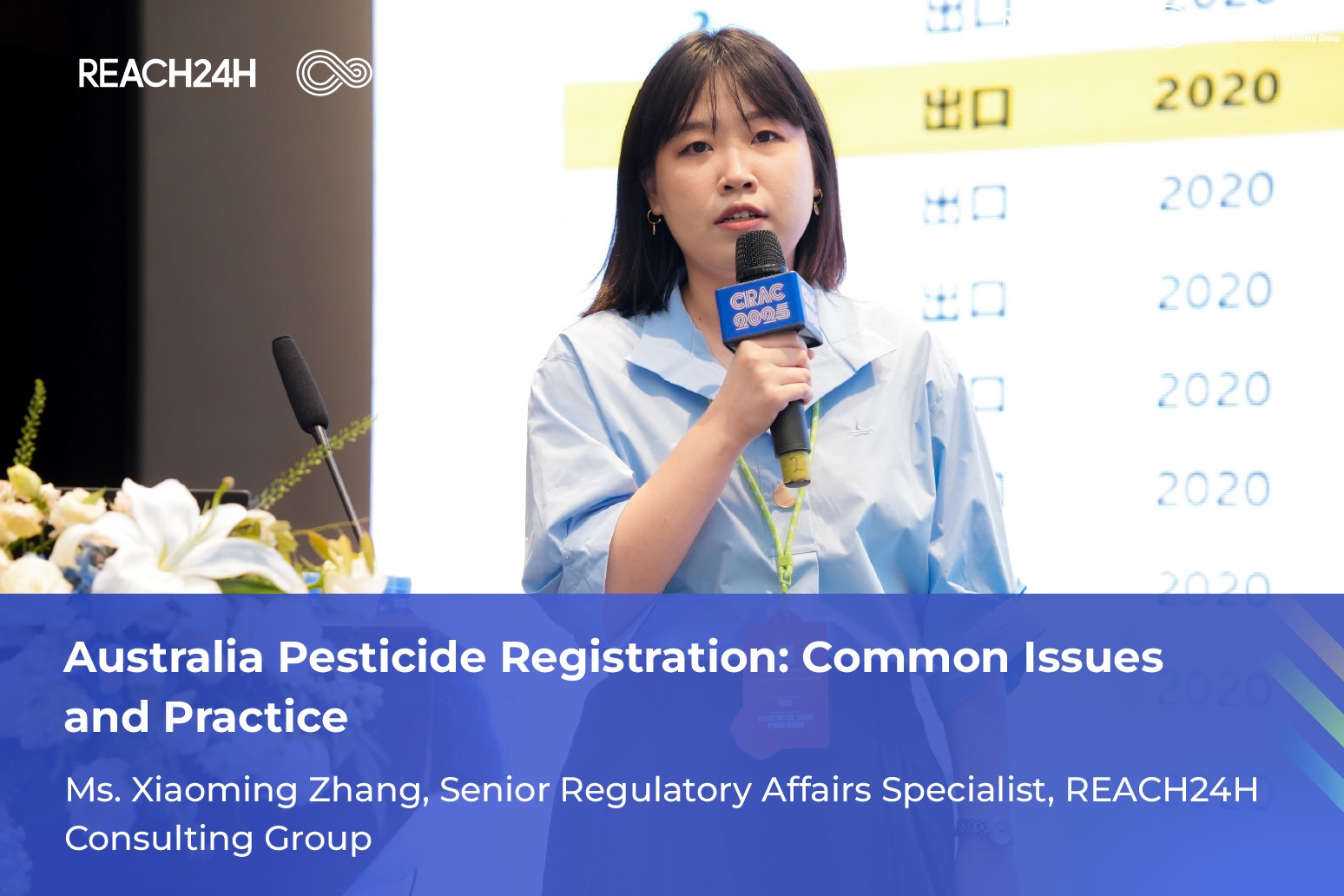
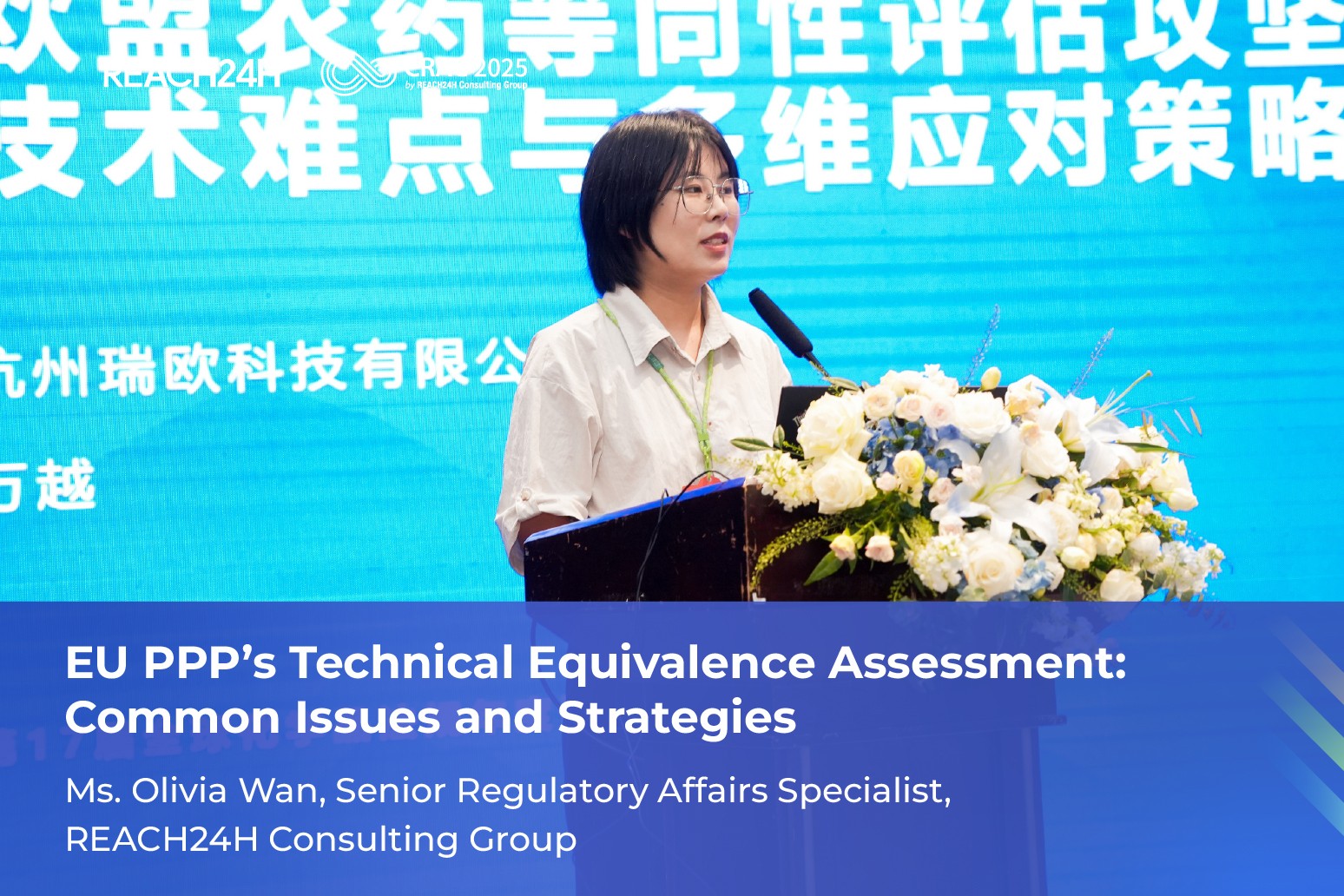
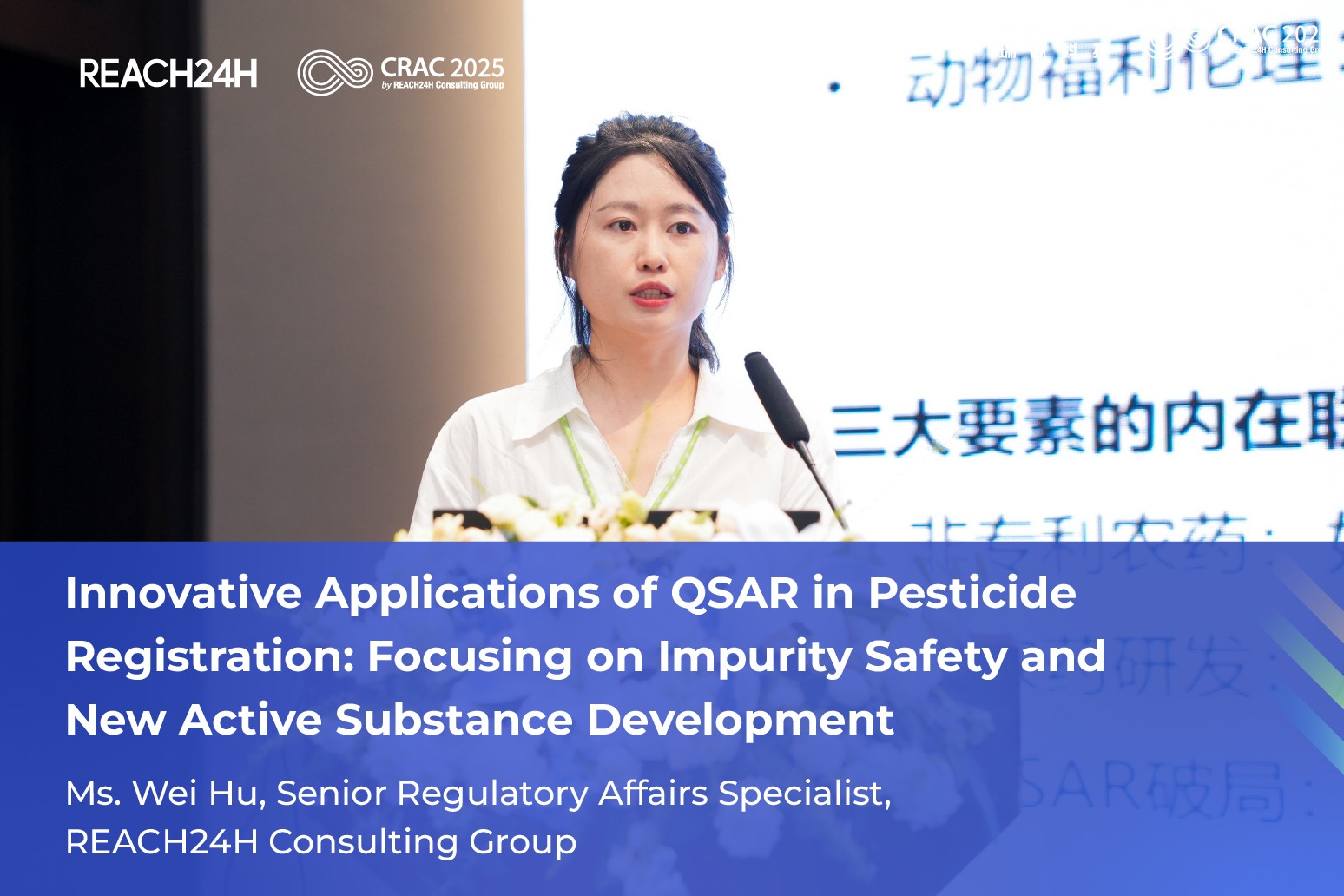
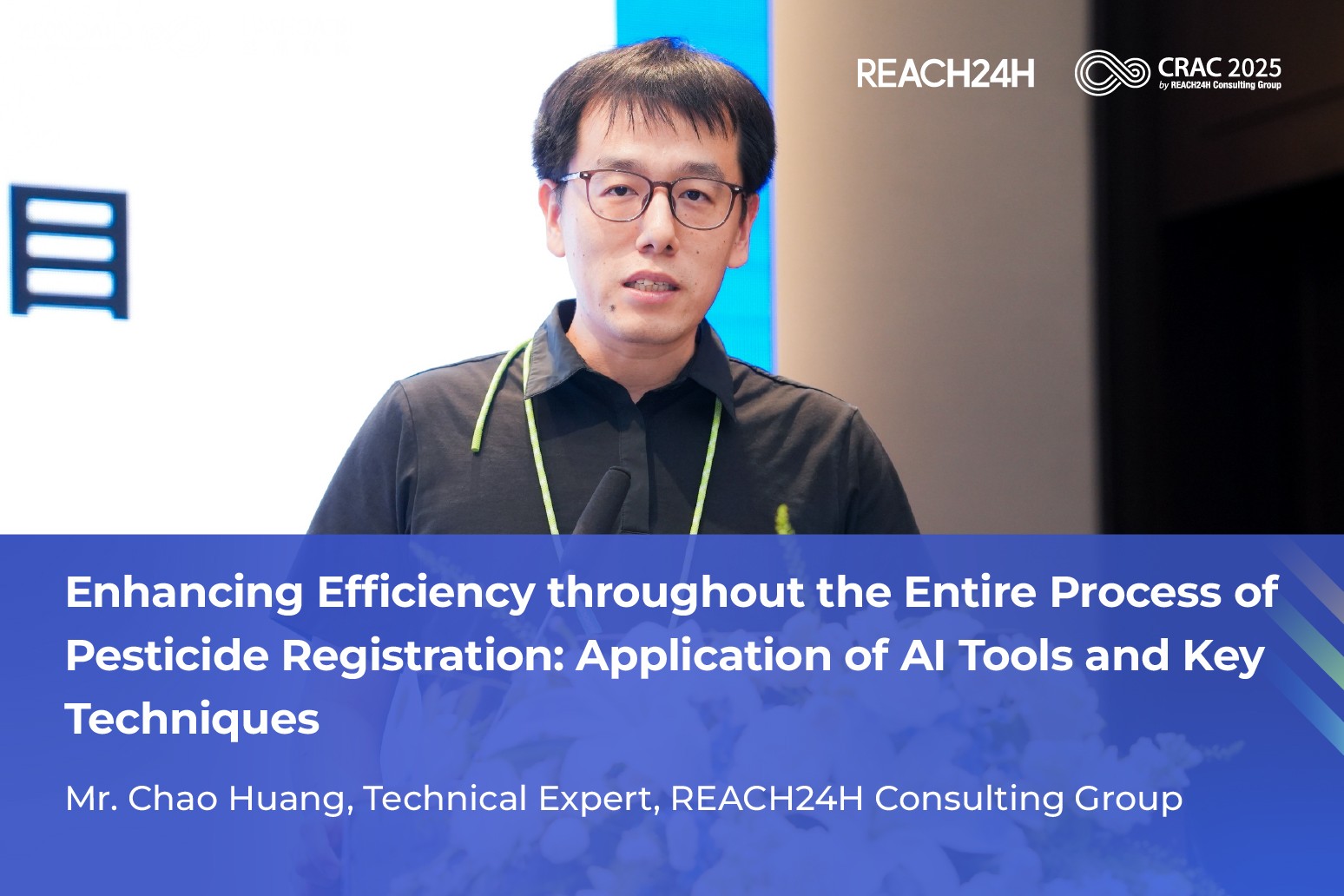
Looking Ahead: CRAC’s Global Journey Continues
Following the success in Hangzhou, CRAC will continue its journey in Japan and Singapore, fostering international dialogue, knowledge exchange, and collaboration across industries. The forum highlighted that continuous innovation, cross-border partnerships, and regulatory modernization are key to driving global progress and sustainable development.
About CRAC
Since 2009, the Chemical Regulatory Annual Conference (CRAC) has brought together global forces for 17 consecutive years to build industry dialogue, invite global government agencies, industry experts, and business representatives to discuss global chemical management trends, exchange international advanced management experience, and extend to sub-sectors such as pesticides, disinfectants, cosmetics, food contact materials, pharmaceuticals, green and low-carbon sectors, and promote green, safe, and sustainable development of the industry, injecting new vitality into the benign development of the industry.
Over the years, CRAC has established partnerships with renowned institutions such as the Helsinki Chemicals Forum (HCF), the United Nations Environment Programme (UNEP), the European Commission (EC), the Organisation for Economic Co-operation and Development (OECD), and more. Notably, CRAC has attracted distinguished global government agencies and associations to its events, including the Ministry of Ecology and Environment of China, the Ministry of Emergency Management of China, the Ministry of Transport of China, the Ministry of Agriculture and Rural Affairs of China, the European Chemicals Agency, the United States Environmental Protection Agency, the National Institute of Environmental Research of South Korea, and many other government agencies and organizations.
CRAC Organizer: About REACH24H
Established in 2009, REACH24H Consulting Group specializes in delivering comprehensive global market access services to companies operating in various sectors such as industrial chemicals, agrochemicals, disinfectants, cosmetics, food, packaging materials, pharmaceuticals, and automobiles.
Our diverse team comprises technical experts and international trade specialists based at our headquarters in Hangzhou, China, as well as branches in the US, the UK, Ireland, South Korea, Japan, and Singapore. Through strategic networking with businesses, associations, and government authorities across regions, we stay ahead of compliance needs, ensuring comprehensive solutions and proactive planning.
With a 24-hour global consulting service network and a team of technical experts, REACH24H helps enterprises and high-quality products take the initiative to trade, improving their understanding of technical barriers and assisting international trade departments and businesses to move from passive to active in the global market. Our extensive track record boasts successful assistance to over 15,000 companies worldwide, enabling them to navigate the global market seamlessly and bypass technical trade barriers.




